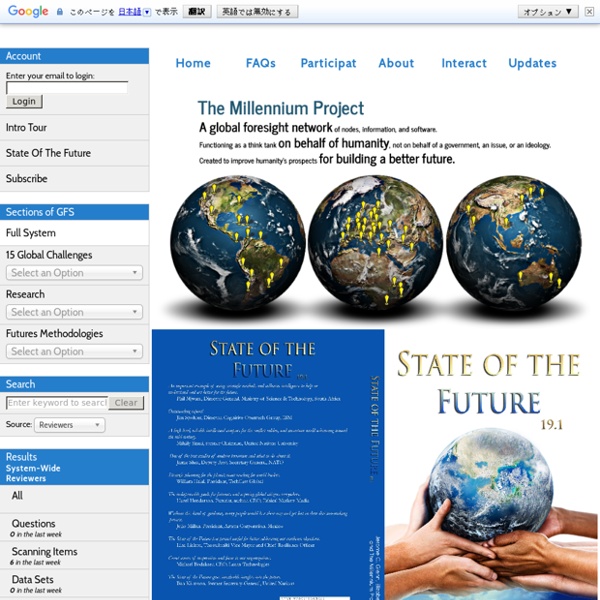



The Millennium Project – TMP The Future-Proof Entrepreneur: 25 New Tech Trends Have these predictions come true? Click on the highlights to read how the world has changed since 2010. If you'd like to add your own insights, comments, or questions, visit the article on Genius, highlight the relevant text, and click the button that pops up. Your annotation will appear both here and on Genius. Pesky thing, tomorrow. Day after day, it shows up and brings technological innovation that alters the best-laid plans of every business owner. Managing for the future isn't easy. To keep you sane--and to try to help you get some sleep at night--here is our list of the top 25 tech tips, trends and megatrends: what's new now, what will be new tomorrow and what you can expect to grapple with even farther down the road. What's New Now 1. The major software players are in a battle royal to sell you word processing, spreadsheets and other web-based office software. 2. Insider tip: Follow the app development communities on Facebook and Twitter. 3. 4. 5. 6. Top interactive projectors: 7.
GFIS Description: The Spain Node was established in 2010, under the auspices of PROSPEKTIKER in San Sebastián. Most recent work is the translation and analysis of initial Millennium Project Work/Tech 2025 study with support from Telefonica. The first Node meeting of the Spanish Node was held on May 11, 2010. Attendees of the May 11, 2010 meeting were: Ibon Zugasti – Prospektiker, Instituto Europeo de Prospectiva y EstrategiaMikel Irasuegi - Prospektiker, Instituto Europeo de Prospectiva y EstrategiaJose Luis Salmeron - Universidad Pablo de OlavideJosé Manuel Echavarren - Centro de Estudios Andaluces Fátima Gómez – Centro de Estudios Andaluces Jose Miguel Echarri - Instituto de Prospectiva EstratégicaAne Bustinduy - LKSAitor Aranguren- Diputación Foral de Gipuzkoa News on the activities of the Spanish Node can be found at: Activities since 2010 Node Presentation by Ibon Zugasti, July 2010. Node Presentation by Ibon Zugasti, July 2011. Contact
The far future: tech trends of 2025 What if you could peek into the future? Other than changing your investment strategy, you might want to know how the gadgets and tech we use will change. Yahoo could die a slow death …or become the next powerhouse. Apple might continue to dominate, or the phone and a tablet we use today could become the dinosaurs of tomorrow. We asked legendary design firm Frog to tell us what the future will look like. EXCLUSIVE: The gadgets of 2025: A vision of the future Technology defines our culture -- in the future, it will define it even more. Buckle down for the ride. Just when you thought speech-enabled tablets were cool. 1. 'Robots will protect us, cultivate our raw food, and take care of our health -- and look after our parents Yet, according to security expert Tal Klein at Bromium, the far-future trend will shift even further. “You will be worth what you know and can contribute,” he told FoxNews.com. 2. “There will be robots in agriculture, defense and medicine,” Grishin said. 3. 4. 5.
Global Futures Intelligence System Versión Española Global Futures Intelligence System (GFIS) To subscribe click here Short video overview Short description The Millennium Project (MP) is integrating all of its information, groups, and software into a "Global Futures Intelligence System" (GFIS). Instead of publishing the State of the Future once a year, the material is being updated in the Global Futures Intelligence System on a continual basis – the same is true with Futures Research Methodology – you do not have to wait five or so years to get a new version. The GFIS is not just new software, vast information, and global experts; it is also a system to produce synergies among these three elements for greater intelligence than their separate values. Introduction to the Global Futures Intelligence System To subscribe to the Global Futures Intelligence System (GFIS) please choose one of the following options: (clicking on the button will take you to a secure order and payment form provided by 2checkout.com)
6 tech trends for 2015 that will change our future Technology and innovation can be frustrating to watch in action. That’s because there usually isn’t much action — just incremental change with occasional flashes of brilliance. But the only way to truly understand what’s happening and why is to keep watching. Breakthroughs from years ago are finally leading to real products and services today. Others are inching forward with the promise of big changes in 2015 and beyond. Of course, you have to know where to look. 1. Image: Mashable, Bob Al-Greene I suspect by now you’re getting tired about hearing about Big Data, but ignoring this number-crunching wave would be a mistake. We’re not just generating data; we’re capturing it at an unprecedented rate, first through web sites and now more frequently through mobile apps and sensors we'll wear with increasing regularity in 2015. Next year, companies such as Intel and IBM will turn all that data into powerful decision-making tools 2. 3. Shah said 4. 5. 6. Have something to add to this story?
Saving for a rainy day – and managing other unexpected shocks - Think Forward Initiative 1 Grinstein-Weiss, M., Russell, B. D., Gale, W. G., Key, C. & Ariely, D. (2017) Behavioral Interventions to Increase Tax-Time Saving: Evidence from a National Randomized Trial. The Journal of Consumer Affairs, Spring, 3-26. 2 Ainslie, G. (1992) Picoeconomics. 3 Weinstein, N. 4 Howard, C., Hardisty, D., Sussman, A. & Knoll, M. (2016) Understanding the Expense Prediction Bias", in Moreau, P. & Puntoni, S. 5 Ratner, R. rockita/Environmental_Intelligence: Data for Environmental Intelligence: A mega list of Earth System Datasets covering earth observations, climate, water, forests, biodiversity, ecology, protected areas, natural hazards, marine and the tracking of UN's Su
El proyecto GDELT Drawdown